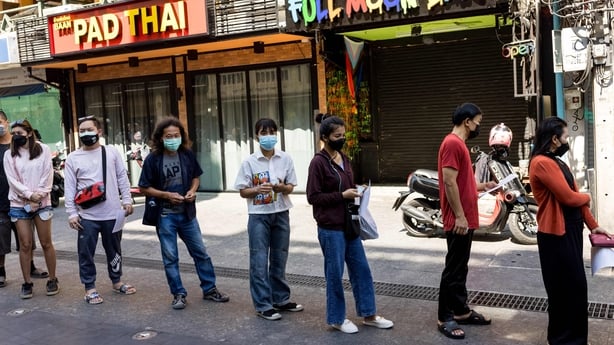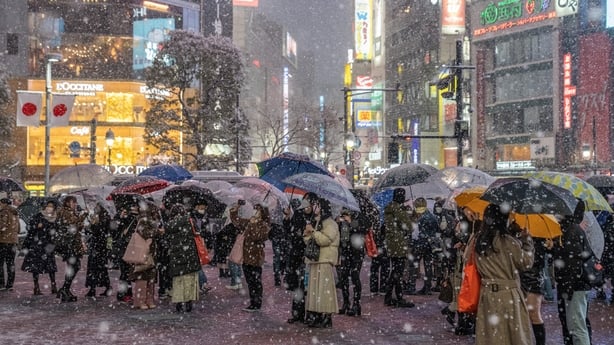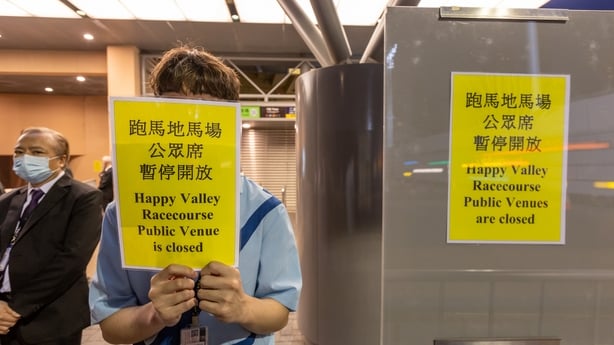German Chancellor Olaf Scholz will meet regional leaders to agree new measures to tackle the highly contagious Omicron variant of the coronavirus, including tighter restrictions on restaurants and bars.
Among steps being considered is a requirement for people with only two coronavirus shots to show proof of a negative test to enter a restaurant or bar, in an effort to encourage more people to get a booster.
Health Minister Karl Lauterbach said the hospitality industry was a "problem area, as people often sit there for hours without a mask", in an interview with broadcaster RTL Direkt.
Hendrik Wuest, the premier of North Rhine-Westphalia, Germany's most populous state, told the news outlet Welt that tighter dining rules were reasonable since being around maskless people required maximum protection and the booster shot was available to everyone.
Rules on quarantine are also set to be relaxed, meanwhile, to avoid having too many people in isolation at the same time, especially in critical sectors.
Omicron now accounts for 44% of coronavirus infections in Germany, the Robert Koch Institute (RKI) for infectious disease said in its weekly report, based on coronavirus tests.
It said 41.6% of people had received a booster shot.
Guido Zoellick, president of the DEHOGA hospitality industry association, called for financial support to prop up businesses that are already faltering from existing measures.
The northern German maritime state of Bremen has the country's highest Covid-19 vaccination rate by far, but it has become the hardest-hit by the rapid spread of the Omicron variant, reporting the highest infection rate of any region in Germany.
Experts say that the spike in Bremen could herald where Germany as a whole is heading in the coming days.
The seven-day infection rate in Bremen stood at 800 cases per 100,000 residents yesterday, the highest in Germany and more than double the national rate of 303, according to RKI.
"I assume that Bremen is just a little further ahead than other federal states," said Hajo Zeeb of the Leibniz Institute for Prevention Research and Epidemiology in Bremen.
He said he expected many of Germany's federal states to report infection rates similar to Bremen in the coming days.
Bremen's location near the Netherlands and Denmark, where Omicron has already become the dominant variant, could be one reason for the higher infection rate in the state, he added.
However, despite the record infection rate in Bremen, the state's hospitals were not as burdened as they were in the first three waves of the pandemic as patients infected with the new variant were coming in with milder symptoms, said Lukas Fuhrmann, spokesperson for Bremen's health senate.
Doctors say the situation in hospitals could however soon worsen and that non-intensive care units were already overburdened with patients with milder lung symptoms.
Thailand announces further curbs after cases rise
Thailand will extend the suspension of its quarantine waiver programme and bring in new restrictions after a jump in new coronavirus cases linked to the Omicron variant, the government's Covid-19 taskforce has said.
New applications for Thailand's "Test & Go" quarantine waiver scheme will not be approved until further notice to stem the increase of coronavirus infections, a spokesman said.
But existing applicants can still enter Thailand without quarantine until 15 January, he said.
Due to concerns over Omicron, Thailand had halted the waiver programme since 22 December and also most of its "sandbox" schemes, which requires visitors to remain in a specific location for seven days but allows them free movement during their stay, except for the resort of Phuket.

But from 11 January, Thailand will allow quarantine-free entry into the country via the previously suspended sandbox schemes of Samui Plus, Phang Nga, and Krabi.
Thailand would also lift on 11 January an entry ban on people travelling from eight African countries it had designated as high-risk.
To curb local virus transmissions, alcohol consumption in restaurants will be halted after 9pm in eight provinces including the capital Bangkok from Sunday, and banned in the country's other 69 provinces.
Thailand reported 7,526 cases of the coronavirus today, the highest number since early November and more than double the number on 1 January.
India's Covid-19 cases set for new highs as Omicron spreads
India's daily Covid-19 cases jumped to 117,100 today, a five-fold increase in a week and on course to overtake its previous infection peak as the fast-spreading Omicron variant replaces Delta in cities.
Government officials have privately said they are working under the assumption that daily infections will surpass the record of more than 414,000 set in May, given what has happened in countries such as the United States where daily cases recently rose past 1 million.
Nearly 70% Indians had been exposed to the coronavirus by the middle of last year, while an almost equal proportion ofa dults have been fully vaccinated as of this week.
Health officials in the capital, New Delhi, and the state of Maharashtra, home to the city of Mumbai, which together accountf or the bulk of new cases, have said hospitals and testing infrastructure have yet to come under pressure as many people are recovering quickly at home.
In Mumbai, about quarter of all tests are positive but fewer than a fifth of those who have contracted the virus have needed hospitalisation, Maharashtra Health Minister Rajesh Tope told reporters.
The city recorded 20,181 new infections yesterday, well above its previous high of just over 11,000 set last year.

"Around 80% of the hospital beds are still empty," he said. "Oxygen demand is not rising in proportion to the rising cases. Right now, there is no plan to impose a lockdown. If required, we may increase restrictions."
The state has closed schools and colleges and limited the number of people allowed in cinemas, at weddings and other functions.
Delhi, where daily cases have risen by more than five times in a week, goes into a 55-hour lockdown from tonight until Monday morning.
Authorities have also imposed a night curfew on weekdays, closed schools, and ordered most shops to open only on alternate days when there is no curfew.
India's Covid-19 deaths rose by 302 today, taking the total to 483,178. Total infections stand at 35.23 million, only fewer that the US tally of about 58 million.
Japan set to declare Covid-19 curbs in 3 regions hosting US bases
Japan is set to declare quasi-emergency measures in three regions to stem a Covid-19 surge that some officials have linked to US military bases in the country.
It would mark the first such measures since September, when Japan lifted emergency controls that had prevailed over the country for most of last year.
The plan was advanced by a government panel and health experts. Prime Minister Fumio Kishida is likely to grant official approval later today.
The Omicron variant has been found in about 80% of Japanese prefectures, and coronavirus cases are surging. New infections exceeded 4,000 nationwide on Wednesday, compared with an average of about 200 per day last month.
"There are cases where there is no history of overseas travel and the route of infection is unknown, while the Delta strain also continues to spread," Health Minister Shigeyuki Goto told reporters.
"We must be prepared for the rapid spread of infection in the future," he added.
The new measures, affecting the southern prefecture of Okinawa and the western prefectures of Hiroshima and Yamaguchi, would last from 9 January until the end of the month.

All three regions host bases for the US military, which yesterday announced stricter infection controls at Japan's urging after on-base outbreaks appeared to have spilled into surrounding communities.
Governors of the prefectures had requested the quasi-emergency steps, which include limited opening hours for bars and restaurants, after seeing a surge in cases, driven by the Omicron variant.
The southern island chain of Okinawa, host to 70% of US military facilities in Japan, has been the hardest hit so far, in what appears to be the nation's sixth wave of the pandemic.
Infections have also been on the rise in Japan's major metropolitan areas. Tokyo reported 641 new cases yesterday, the most since 18 September.
Tokyo will strengthen counter measures by directing restaurants to limit diners to groups of four, down from eight, the Kyodo news agency reported.
Hong Kong bars, restaurants face more pain with return of restrictions
Hong Kong's bars, restaurants and caterers say tighter restrictions aimed at averting a new wave of Covid-19 infections may cause hundreds of millions of dollars in losses, threaten jobs and even, for some, their survival.
The global financial hub is one of the world's last holdouts sticking to a goal of stopping local transmission of the virus, deploying draconian and costly quarantine measures and largely isolating itself from the world.
But a streak of three months without community cases in Hong Kong ended with the confirmation on 31 December of the first local transmission of the Omicron variant - and numbers have been ticking up since then - prompting authorities to reinstate a raft of restrictions on daily life.

Today, 15 types of venues, including bars, clubs, gyms and beauty salons had to close for at least two weeks. Restaurants can stay open until 6pm, but are only allowed to offer takeaway service after that.
Ben Leung, president of the Hong Kong Licensed Bar and Club Association, which represents about half of the city's 1,400 or so bars, clubs and karaoke venues, estimates losses of about HK$400 million in the next two weeks.
While he does not foresee closures, unless the restrictions last much longer, he said some of the 20,000 full-time jobs in the industry may be at risk.
Economists at BofA Securities estimate the restrictions could chop 0.1-0.2 percentage points off their first-quarter 2.4% economic growth forecast if the measures extend into the Lunar New Year.

